
Birds are readily found on public lands, especially in Nebraska and South Dakota, and hunting them in their native grassland homes offers a sense of wildness that is so often missing with other species. Also, in the early season the otherwise notoriously spooky birds often hold tight, offering the opportunity to hunt them with pointing dogs.
While all this sounds great and drives flocks of hunters to the prairies each fall, the reality remains that finding greater prairie chickens in the vast native grasslands is tough. Although the sheer expanse of grass with rolling hills and vistas provides nearly endless places to hunt, birds are not evenly distributed across the landscape. As a result, a first-time chicken hunter can often waste many frustrating and fruitless hours walking in hot, dry conditions without moving anything but meadowlarks.
It doesn’t have to be this way. Like all game birds, greater prairie chickens follow seasonal patterns of habitat use and food preferences that help hunters narrow down where to find them. Moreover, greater prairie chickens have a unique social structure that drives much of their activity in the fall. Coupled with a little advance scouting, this can make them predictable and easier to find. Focusing on these social dynamics as well as habitat preferences and food needs can lead to a better early season greater prairie chicken hunt.
Locate the Leks
Greater prairie chickens’ worlds revolve around leks or booming grounds as they are often called. These are small areas, often less than an acre in size where, during the spring mating season, males display and call to attract females. While the heaviest use of leks occurs during breeding season from late February through April, the birds use these areas all year long:
This story is from the Summer 2023 edition of The Upland Almanac.
Start your 7-day Magzter GOLD free trial to access thousands of curated premium stories, and 9,000+ magazines and newspapers.
Already a subscriber ? Sign In
This story is from the Summer 2023 edition of The Upland Almanac.
Start your 7-day Magzter GOLD free trial to access thousands of curated premium stories, and 9,000+ magazines and newspapers.
Already a subscriber? Sign In

Tail feathers - STANDARDS AND PRACTICES
\"An armed society is a polite society,\" the NRA says in one of its dicta, cribbed from Robert A. Heinlein, a 20th-century American science fiction writer.
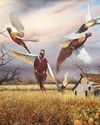
Day's End - IN PRAISE OF FENCEROWS
Driving north along the Hudson River, I gazed at a pastoral autumn scene: sere fields of faded yellow harvested corn, stubbly and broken amongst the clods of black earth, almost smooth from my vantage point. Spiky brown veins of wild growth marked barriers between plots. Occasionally, the gray bones of a mature oak rose among the brown shrubs to stand over the yellow fields. A sentry, keeping silent watch as white frost crystals slowly melted into invisibility.
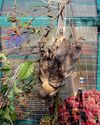
That Time of Year Again
Without doubt. The most idyllic form of hunting in Ohio is seeking the woodcock. - Merrill Gilfallan, Moods of the Ohio Moons: An Outdoorsman's Almanac (1991)

I Don't Wanna'!
I'm an old hand at being retired, though - have been practicing for 25 years.
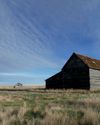
Hunting the Huns: Alberta's Big Sky Country
The prairies of southern Alberta are vast, beautiful and full of prime bird habitat. Crop fields are interspersed with abandoned farms, rolling hills are intersected by coulees and creek beds, and Hungarian partridge and sharptailed grouse occupy some of the best and most picturesque habitat on the continent.
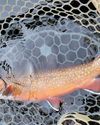
Side Dish - End of Season
Sporting trips are not only about sport, as many other experiences are discovered alongside. And my trip to Lakewood Camps in Maine was certainly just that.
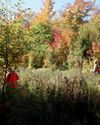
AN EXTENDED STAY
There is no reason to leave Michigan in the fall unless the opportunity of a cast and blast adventure at a historic sporting lodge in Maine comes calling.
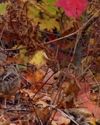
KEEP IT HANDY
If you think shooting a ruffed grouse on the wing with a shotgun is tough, try shooting one in flight with a still camera.
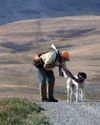
A Longtime Love Affair
It's possible to hunt your favorite birds in a lot of different places, I suppose, but I don't do that.
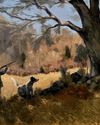
Profile of an Artist: Harley Bartlett
Harley Bartlett was born in 1959 near Pittsburg, Pennsylvania. However, having lived in Rhode Island for most of his life he considers himself a Rhode Islander.